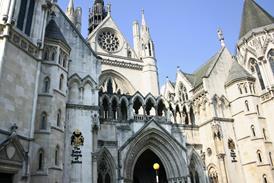In this case, Mr Justice Teare considered whether the claimant company providing legal services could recover costs for the time spent on the litigation by its sole shareholder, a solicitor advocate.
Background
The application arose out of a long, drawn-out dispute between the claimant and its former clients, concerning the claimant’s fees for acting for the defendants in a London arbitration.
In March 2013, the claimant secured an ICC arbitration award in its favour for payment of its fees. The defendant made an unsuccessful attempt to set aside that award. There were proceedings in England to enforce the award and the cost of certain hearings were received.
The issues
In the present application, the court considered:
(1) the incidence of costs
(2) whether costs should be awarded on a standard or indemnity basis
(3) whether the claimant, as part of its recoverable costs, was entitled to compensation for the time spent by Mr Shackleton, a solicitor advocate and sole shareholder of the claimant, as the claimant had also engaged the services of a solicitor and counsel.
Costs
The first issue concerned a hearing which had taken place before Mr Justice Flaux, in which the defendants obtained a stay of enforcement of the award on the condition that security was paid into court. The defendants argued that two points were argued during the application and that it had succeeded on both. The claimant argued that its application to enforce the ICC award had ultimately succeeded.
The judge concluded that the claimant should recover 80 per cent of its costs to reflect the fact that it had ultimately succeeded in the action, but that 20 per cent of the costs should be the subject of no order to reflect the issues on which the claimant lost.
Indemnity costs
There was no dispute that ‘an order for indemnity costs can be justified where there is some conduct or circumstance which takes the case out of the norm. There must usually be a significant level of unreasonable behaviour. The court must keep in mind that an order for indemnity costs removed the requirement that costs be proportionate to the matters in issue’.
The claimant argued that there were 13 reasons why an order for indemnity costs was appropriate. The court found that only three reasons had merit.
(1) The defendants’ unreasonable failure to settle the claimant’s claim
(2) Their unreasonable introduction of issues which were irrelevant
(3) Their unreasonable conduct during the litigation, which was designed to delay payment of the sums which had been awarded to the claimant.
In the present case, the court found that the first two issues did not justify indemnity costs. The defendant had unreasonably delayed payment of the sums awarded, a very significant level of unreasonable conduct which justified an order for indemnity costs.
Mr Shackleton’s time
The claimant is a company. It earnt fees by providing the services of Mr Shackleton as counsel or an arbitrator in international arbitrations. The claimant sought an order that it could recover as part of its costs compensation for the time spent by Mr Shackleton on the case against the defendants, in addition to the costs incurred by the claimant in instructing outside solicitors.
In response, the defendants asserted that such an order would breach the indemnity principle, ie that a successful party cannot recover more than it is liable to pay. The defendant also highlighted that Mr Shackleton’s charge-out rate was £800 per hour, which was more than double that of the solicitor instructed by him.
Several authorities were considered, including London Scottish Benefit Society v Chorley [1884] 13 QBD 874 in which Lord Justice Bowen stated:
‘Professional skill and labour are recognised and can be measured by the law; private expenditure of labour and trouble by a layman cannot be measured. It depends upon the zeal, the assiduity and nervousness of the individual. Professional skill, when it is bestowed, is accordingly allowed for in taxing a bill of costs; and it would be absurd to permit a solicitor to charge for the same work when it is done by another solicitor and not to permit him to charge for it when it is done by his own clerk.’
In the present case, there were two alternative arguments (paragraphs 51-54):
‘A cogent argument can be made in this case that, although Mr. Shackleton has bestowed his professional skill upon the Claimant and that the time he spent doing so can be measured, the principle established by London Scottish Benefit Society v Chorley does not apply. The Claimant is the litigant, not Mr. Shackleton. The court cannot ignore the separate personality of the Claimant. The Claimant has not expended its own “time and trouble” in respect of which it claims to be indemnified. It has suffered no loss. Mr. Shackleton has expended his own “time and trouble” and has suffered loss but he has no status in the litigation as a party and has chosen not to charge the Claimant for his services. The cases on in-house solicitors or experts do not assist because the Claimant does not employ Mr. Shackleton and so does not suffer a loss by paying him a salary.
‘But a cogent argument can be made the other way. The Claimant has suffered a loss because as a result of Mr. Shackleton spending his time on the Claimant’s pursuit of its fees the Claimant cannot use his services to earn fees for the Claimant in other cases. There is no doubt that at least some of the services performed by Mr. Shackleton were not duplicated by the solicitor and counsel instructed by the Claimant. For example he appeared as counsel before Flaux J. and he prepared the Skeleton Argument for this application. If the Claimant had instructed a solicitor and counsel to do that work there is no doubt that it would recover the costs of so doing. It would be odd if by using Mr. Shackleton to do that work the Claimant could recover nothing in respect of his work. That suggests that a just result would be one which enabled the Claimant to recover a reasonable and fair amount of his time.
‘This is an unusual case and none of the cases to which I was referred deal with its circumstances. I suspect that in legal practice, at any rate in this jurisdiction, it is unusual for a lawyer to provide his services through a company in the manner in which Mr. Shackleton does. Having considered the opposing arguments I have reached the conclusion that the Claimant can recover a reasonable and fair amount in respect of Mr. Shackleton’s services. I do not consider that such a conclusion breaches the indemnity principle because a broad understanding of “loss” is appropriate in this field. Further, to disallow his time would risk pushing “abstract principle” to a point where the result was not consistent with justice.
‘What is a reasonable and fair amount to be recovered in respect of Mr. Shackleton’s services must be considered on assessment, in the event that the parties cannot settle the matter….’
Conclusion
(1) The claimant recovered 80 per cent of the costs
(2) The claimant’s costs were assessed on the indemnity basis
(3) The claimant was entitled to recover costs in respect of the work done by Mr Shackleton in a reasonable and fair amount.






















